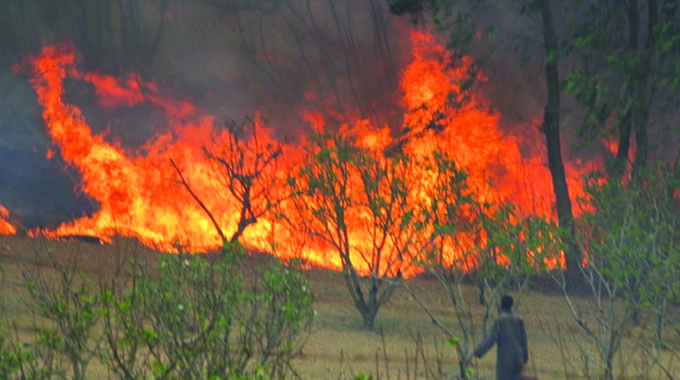
The ManicaPost

Samuel Kadungure
Senior Reporter
THE fire season is around the corner and everyone must jealously guard against veld fires in Manicaland.
Veld fire are blazes that sprint out of control and destroy vast tracts of forests, resulting in loss of biodiversity, human and animal life as well as property.
Fire-prone districts in the province are Makoni, Chimanimani, Nyanga, and recently Buhera.
The wanton burning of vegetation means reduction in carbon sequestration from the atmosphere, and the smoke produced in the infernos produce massive carbon dioxide, which is a greenhouse gas causing global warming.
Forests burning is a single largest contributor to greenhouse gases in the dry season in Zimbabwe.
The infernos lead to increased loss of agricultural produce, reduced food availability for humans and animals, reduced vegetative cover and growth rate and loss of property.
Farmers also lose livestock directly to veld fires.
The burning chews pastures, thereby leaving the surviving livestock facing starvation.
The overall impact is household food insecurity.
At household level, loss of shelter through veld fires traumatises families.
Property loss, such as the destruction of a home or damage to personal goods, can be a source of grief, while lack of shelter means sleeping in the open with no food supplies and proper water and sanitation facilities.
Loss of livelihoods may also disintegrate families.
For poor and vulnerable farmers, loss of assets, housing and crop harvest further exacerbate their already low food and income security, ushering them into a deep poverty cycle.
Regardless of promulgation of several laws — the Environmental Management Act (Chapter 20:27) of 2007, Parks and Wildlife Act (Chapter 20:14) of 1996, and Forest Act (Chapter 19:05) of 1996 and the Traditional Leaders’ Act of 1998 aimed at preventing fires — veld fires remain a perennial problem.
They cause great damage to Zimbabwe’s natural resources, forests, animal habitat and even lead to the loss of lives and valuable property.
The upsurge in fire incidences in Manicaland puts to the fore the need for the province to focus on strategies that can mitigate the negative effects of the blazes through early detection, quick reaction and suppression.
However, it is impossible to completely eliminate veld fires.
Environmental Management Agency (EMA) education and publicity officer, Mrs Alice Rutsvara said most fire incidences are deliberate, hence the clarion call to reduce them by 10 percent.
Deliberate fires include fires used for hunting, early burning or back burning to reduce the fuel load, arson and smoking out bees during harvesting of honey.
They also include carelessness such as throwing out lit cigarettes.
Accidental fires arise from locomotives, lightning or spontaneous combustion during very hot dry summers.
Mrs Rutsvara said as the nation approaches the fire season, which saw the National Fire Week being launched last week at Claire, it is imperative for Manicaland to be ready to combat the scourge.
The fire season starts on July 1 and stretches to October 31.
During this period, the fuel load like dry leaves, wood, dead plants and grass, is dry and more susceptible to fires, and nobody is permitted to start fires outside their houses, unless they give a 14-day notice to EMA, the police and their neighbours.
A 24-hour notice must also be given to the above-mentioned institutions before the fire is started.
Mrs Rutsvara said the province must seriously take stock of the harm inflicted by veld fires in previous years and protect the environment from further harm.
“Farmers should put in place fire pre-suppression measures like fire-guards, ash pits, fire-fighting equipment, and do early burning on pasture lands. Farmers need to learn good post-harvest techniques, including safe storage and residue handling as well as ensuring cooperation with neighbours in case of emergencies.
“They must put in place emergency communication systems, including having ready communication instruments and numbers for emergency use,” she said.
The biggest fire experienced last season was at Lone Kop Farm in Rusape where 1 300 tonnes of maize crop worth $49,4 million which was being sun-dried was incinerated in the inferno, while in Buhera 97 houses and 15 cattle kraals were destroyed.
The fires emanated from adjacent small-holder settlements.
“Fortunately, no human loss was recorded in the previous season, and going into 2022, we need to reduce fire incidences by 10 percent. We are also urging all local authorities to have their own fire management strategies in place.
“All farmers must construct fire-guards, while communities and large farms must have firefighting teams. As EMA and the Forestry Commission, we will issue a fire protection order to compel compliance,” said Mrs Rutsvava.
She said fire-guards must be constructed before the fire season, and anyone who will be found without a standard one will be penalised.
Standard fire-guards are at least 9m wide on boundaries, and internal fire-guards should be at least 4,5m wide.
Fireguards stop the fire by removing the fuel load.
They can be constructed by ploughing using ox-drawn ploughs, tractors, disking or hoeing.
A joint study by the Department of Environmental Sciences at Bindura University of Science Education and the Department of Soil Science and Agricultural Engineering at the University of Zimbabwe traced the surge in veld fires to small-holder farmers.
“An upsurge in veld fire incidents is mainly due to poor land clearing methods by the more than 300 000 resettled small-holder farmers.
“In the small-holder farming areas, poor farmers who have limited resources and equipment to clear and prepare the land using mechanical methods frequently use fire for land preparation.
“These land clearing fires often spread beyond the intended area and turn into wild fires, thereby significantly contributing to forest fires,” noted the study which was published in 2013.



